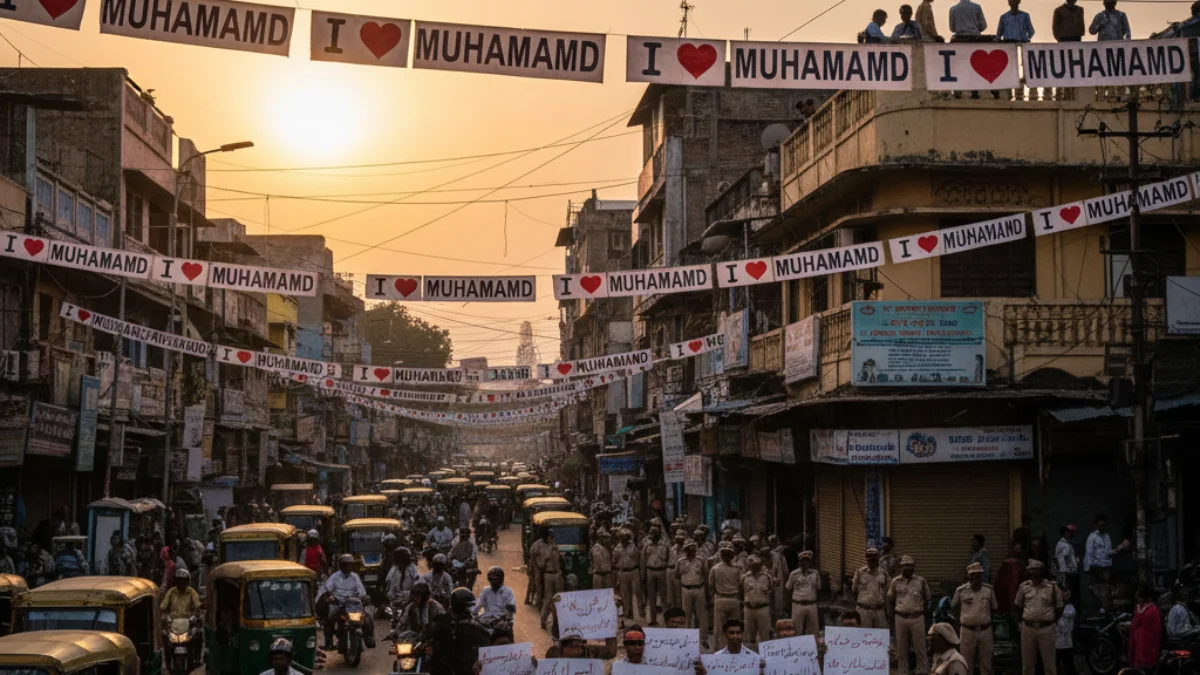In the past two weeks, the "I Love Muhammad" slogan has become the center of heated debate across Uttar Pradesh and beyond. Kanpur police have now issued a clarification, insisting that their FIRs were not about the slogan itself but about violations of procession norms. Officials argue that tents and banners were placed at unauthorized locations and allege that posters of another community were damaged.
The clarification came after uproar on social media and protests in several districts. Critics accused police of criminalizing a simple slogan of love and devotion, while authorities pushed back, framing it as a matter of procedure and law. This article examines how the row began, what the police position is, and why the controversy escalated so quickly.
The Spark in Kanpur and FIRs Filed
The controversy began on September 4 during Barawafat (Milad-un-Nabi) celebrations in Kanpur’s Rawatpur area. A board reading "I Love Muhammad" was displayed along the procession route. Some local groups objected, calling it a new tradition introduced in a sensitive zone.
On September 9, police registered a case against nine named individuals and 15 unidentified persons. The FIR cited disturbance of communal harmony and the introduction of a new custom. Deputy Commissioner of Police Dinesh Tripathi explained later:
"The FIR was not filed for writing 'I Love Muhammad'. It was filed for putting up tents and banners without permission and for damaging posters of another community."
Community leaders strongly disagreed. Imam Shabnur Alam said:
"Neither was a tent put up nor was any poster torn. The FIR is baseless."
Police have said they will review the list of accused and drop names of those not found guilty. Yet the charges have already inflamed passions across Uttar Pradesh.
Protests and Escalation Across States
What began in one neighborhood soon spread across districts and states. By September 23, more than 1,300 people were booked and at least 38 arrested in different parts of Uttar Pradesh.
Key incidents include:
- In Bareilly, stone pelting after Friday prayers led police to resort to lathicharge.
- In Pilibhit, an IMC leader was accused of threatening an officer during the campaign.
- In Uttarakhand’s Kashipur, an unauthorized procession triggered clashes and arrests.
- In Lucknow, women staged a peaceful protest near the Vidhan Sabha with "I Love Muhammad" placards before being shifted to a designated protest site.
Meanwhile, counter-slogans like "I Love Mahadev" and "I Love Ram" began trending online, followed by lighter versions like "I Love Rasgulla". This shows how quickly religious assertion online can spill into both solidarity and satire.
Political Voices and Constitutional Questions
AIMIM leader Asaduddin Owaisi has been among the most outspoken critics. He argued that saying "I Love Muhammad" is protected under Article 25 of the Constitution, which guarantees religious freedom. Owaisi questioned why such an expression of faith should face police action.
Former Jammu and Kashmir Chief Minister Omar Abdullah echoed that view, calling the FIRs irrational and disproportionate.
On the other hand, some political commentators described the campaign as part of a "victimhood toolkit," accusing organizers of fueling unrest for political mileage.
The police stand by their line: the action was procedural, not religious. But in practice, separating law from faith is proving difficult in a polarized environment.
What is Really at Stake
This controversy raises wider questions that go beyond one banner or slogan:
- Freedom of expression: Can a faith-based slogan be restricted in public if it offends some groups?
- Rule of law: Should minor procedural violations justify sweeping FIRs that name over a thousand people?
- Policing optics: Mass bookings, even if later dropped, risk deepening mistrust between communities and law enforcement.
- Communal balance: Symbolic disputes can escalate rapidly into violence if not handled with dialogue and restraint.
For a deeper analysis of how local regulations intersect with civil liberties in protests, see Nuvexic’s coverage on public assembly laws.
Conclusion
Kanpur police are trying to walk a fine line between maintaining order and upholding rights. Their clarification that the "I Love Muhammad" slogan itself is not criminal is an attempt to defuse anger. Still, for many in the community, the explanation does not erase the perception of selective policing.
The controversy has become more than a local issue. It is now a test case of how India balances freedom of religious expression with procedural enforcement in a volatile political climate.
The story is far from over. Courts, community leaders, and civil society will play a decisive role in shaping the next chapter.
Word count: 1,047
Frequently Asked Questions
Q: What triggered the "I Love Muhammad" controversy?
It began when a banner with the slogan was displayed during a Barawafat procession in Kanpur. Local objections and police FIRs followed, sparking wider protests.
Q: Were people booked for saying "I Love Muhammad"?
Police say no. Officials insist the FIRs were filed for unauthorized use of space, tents, and banners, and for damaging other posters.
Q: Is saying "I Love Muhammad" a crime in India?
No. The Constitution protects freedom of religion and expression. The legal debate is about context, location, and permissions.
Q: How many people have been affected by FIRs?
Over 1,300 people have been booked and around 38 arrested across Uttar Pradesh and nearby states as of late September 2025.
Q: What do political leaders say?
Asaduddin Owaisi and Omar Abdullah defend the slogan as a matter of faith. Some others suggest the campaign is politically driven.
Q: What happens next?
Courts may examine the validity of FIRs. Police have said they will drop names of those found innocent during investigation.

